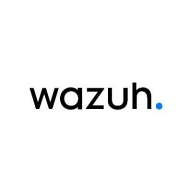

Wazuh and Cribl are competitors in the security and data management space. Wazuh has a cost advantage due to its open-source nature, making it an attractive option for smaller businesses with its excellent security features, while Cribl offers advanced data processing for larger enterprises.
Features: Wazuh excels in providing extensive security with modules such as file monitoring, asset management, and EDR capabilities. It supports integration with platforms like AWS and Kubernetes and offers real-time threat detection. Cribl stands out for its log processing and data pipeline management, providing flexibility in data routing and transformation, data reduction, and effective log management.
Room for Improvement: Wazuh can improve by integrating native threat intelligence, simplifying configurations, and enhancing AI capabilities. Cribl could benefit from better support for legacy systems, improved logging, debugging, and increased pack support for wider adoption.
Ease of Deployment and Customer Service: Both Wazuh and Cribl offer flexibility in deployments across various environments. Cribl uses tools to leverage cloud efficiencies. Wazuh provides an active community for support, though direct technical support is a paid option with some reported delays. Cribl offers premium-level service with responsive assistance during deployment.
Pricing and ROI: Wazuh offers cost savings due to its open-source availability, ideal for minimizing costs while maintaining security. Cribl's pricing is justified by its advanced features and data management efficiency. Both demonstrate strong ROI, with Wazuh benefiting smaller entities, and Cribl preferred for managing larger datasets.
What we've seen is really an overall reduction of just shy of 40% in our ingest into our SIM platform versus prior to having Cribl.
The second thing is that data aggregation, sampling, and reduction that we're able to do of the data, lowering our overall data volume, both traversing the network as well as what's being stored inside of our final solutions.
In terms of reduction, we were able to save almost ~40% of our total cost.
I have seen value in security cost savings with Wazuh, as using proprietary EDR versions could save us substantial money.
They had extensive expertise with the product and were able to facilitate everything we needed.
Usually, within an hour, we get a response, and we are able to work with them back and forth until we resolve the issues.
Sometimes by hearing the problem itself, they will know what the solution is, and they will let us know how to resolve it, and we do it immediately.
They responded quickly, which was crucial as I was on a time constraint.
We use the open-source version of Wazuh, which does not provide paid support.
The documentation is good and provides clear instructions, though it's targeted at those with technical backgrounds.
The infrastructure behind Cribl Search is also scalable as it uses a CPU and just spawns horizontally more instances as it demands and requires.
Compared to other SIEM tools I use, any slight change on the operating system end impacts a lot on our SIEM tools and other things, but Cribl performs well in that regard.
It's an enterprise version, and we have a good amount of users using this solution.
It can accommodate thousands of endpoints on one instance, and multiple instances can run for different clients.
Currently, I don't see any limitations in terms of scalability as Wazuh can still connect many endpoints.
Scalability depends on the configuration and the infrastructure resources like compute and memory we allocate.
Migrating from those SC4S servers to Cribl worker nodes has truly been a game-changer.
Regarding scalability, we started with zero servers and have around 285 servers now.
I would rate the stability as ten out of ten.
The stability of Wazuh is strong, with no issues stemming from the solution itself.
The stability of Wazuh is largely dependent on maintenance.
The indexer frequently times out, requiring system restarts.
A more stringent role-based access control feature would enhance security and allow granular control over what users can see and access.
If we can have more internal logs and more debug logs to validate the error, that would be beneficial because instead of reaching out to Cribl support, we can troubleshoot and find the root cause ourselves.
In terms of large datasets—whether they originated from network inputs, virtual machines, or cloud instances—ingesting the data into the destination was relatively easy.
Machine learning is needed along with understanding user behavior and behavioral patterns.
The integration modules are insufficiently developed, necessitating the creation of custom integration solutions using tools like Logstash and PubSub.
I think Wazuh should improve by introducing AI functionalities, as it would be beneficial to see AI incorporated in the threat hunting and detection functionalities.
Over time, the licensing cost has increased.
Cribl is very inexpensive, with enterprise pricing around 30 cents per GB, which is really decent.
They have a universal license that allows us to consume the portions of Cribl that we want to use or flex into other portions of Cribl.
Wazuh is completely free of charge.
I would definitely recommend Wazuh, especially considering Fortinet's licensing model which is confusing and overpriced in my opinion.
Totaling around two lakh Indian rupees per month.
The data reduction and preprocessing capabilities make Cribl really unique.
Cribl has a feature called JSON Unroll or Unroll function that allows you to differentiate the events; each event will come ingested as a single log instead of piling it up with multiple events.
The Cribl UI is very simple and easy to use, particularly when working with data from various sources; it makes it very easy to create pipelines, add complex logic to those pipelines, and then gives you a preview of what your data looks like before applying that pipeline and what you get after.
Wazuh is a SIEM tool that is highly customizable and versatile.
The system allows us to monitor endpoints effectively and collect security data that can be utilized across other platforms such as SOAR.
With this open source tool, organizations can establish their own customized setup.
| Product | Market Share (%) |
|---|---|
| Wazuh | 6.4% |
| Cribl | 1.2% |
| Other | 92.4% |

| Company Size | Count |
|---|---|
| Small Business | 9 |
| Midsize Enterprise | 5 |
| Large Enterprise | 20 |
| Company Size | Count |
|---|---|
| Small Business | 27 |
| Midsize Enterprise | 15 |
| Large Enterprise | 8 |
Cribl offers advanced data transformation and routing with features such as data reduction, plugin configurations, and log collection within a user-friendly framework supporting various deployments, significantly reducing data volumes and costs.
Cribl is designed to streamline data management, offering real-time data transformation and efficient log management. It supports seamless SIEM migration, enabling organizations to optimize costs associated with platforms like Splunk through data trimming. The capability to handle multiple data destinations and compression eases log control. With flexibility across on-prem, cloud, or hybrid environments, Cribl provides an adaptable interface that facilitates quick data model replication. While it significantly reduces data volumes, enhancing overall efficiency, there are areas for improvement, including compatibility with legacy systems and integration with enterprise products. Organizations can enhance their operational capabilities through certification opportunities and explore added functionalities tailored towards specific industry needs.
What are Cribl's most important features?Cribl sees extensive use in industries prioritizing efficient data management and cost optimization. Organizations leverage its capabilities to connect between different data sources, including cloud environments, improving both data handling and storage efficiency. Its customization options appeal to firms needing specific industry compliance and operational enhancements.
Wazuh offers an open-source platform designed for seamless integration into diverse environments, making it ideal for enhancing security infrastructure. Its features include log monitoring, compliance support, and real-time threat detection, providing effective cybersecurity management.
Wazuh stands out for its ability to integrate easily with Kubernetes, cloud-native infrastructures, and various SIEM platforms like ELK. It features robust MITRE ATT&CK correlation, comprehensive log monitoring capabilities, and detailed reporting dashboards. Users benefit from its file integrity monitoring and endpoint detection and response (EDR) capabilities, which streamline compliance and vulnerability assessments. While appreciated for its customization and easy deployment, room for improvement exists in scalability, particularly in the free version, and in areas such as threat intelligence integration, cloud integration, and container security. The platform is acknowledged for its strong documentation and technical support.
What are the key features of Wazuh?In industries like finance, healthcare, and technology, Wazuh is utilized for its capabilities in log aggregation, threat detection, and vulnerability management. Companies often implement its features to ensure compliance with stringent regulations and to enhance security practices across cloud environments. By leveraging its integration capabilities, organizations can achieve unified security management, ensuring comprehensive protection of their digital assets.
We monitor all Security Information and Event Management (SIEM) reviews to prevent fraudulent reviews and keep review quality high. We do not post reviews by company employees or direct competitors. We validate each review for authenticity via cross-reference with LinkedIn, and personal follow-up with the reviewer when necessary.